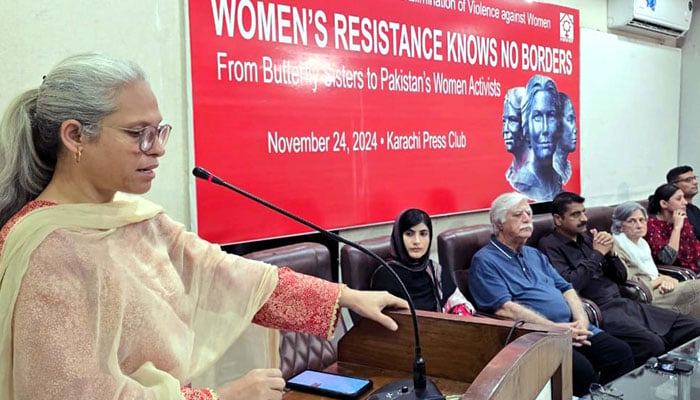Whenever there is oppression, there is resistance, says HRCP chairperson
The Home-Based Women Workers Federation (HBWWF) on Sunday organised a seminar on the theme of women’s resistance against oppression at the Karachi Press Club (KPC).
The seminar was chaired by Human Rights Commission of Pakistan (HRCP) Chairperson Asad Iqbal Butt and attended by a large number of political and human rights activists.
Prominent speakers included Aurat Foundation’s Mahnaz Rahman, Sammi Baloch of the Baloch Yakjehti Council, HBWWF Genera; Secretary Zehra Khan, Sorath Lohar of the Missing Persons Recovery Movement, academic Dr Asghar Ali Dashti, National Trade Union Federation (NTUF) General Secretary Nasir Mansoor and KPC President Saeed Sarbazi.
The speakers at the event paid rich tribute to three revolutionary sisters from the Dominican Republic known as the Butterfly Sisters whose struggle against dictatorship is commemorated globally on November 25.
Zehra highlighted how the sisters, Patria Mirabal, Minerva Mirabal and Maria Teresa Mirabal, became symbols of democratic freedom and women’s empowerment after they sacrificed their lives in the fight against a brutal regime. The United Nations officially declared November 25 as International Day for the Elimination of Violence Against Women in their honour in 1999.
The HBWWF secretary general emphasized that the issues of state oppression, authoritarian governance and misogynistic social attitudes that the Butterfly Sisters fought against persisted globally, including in Pakistan.
She said political activists faced persecution in Pakistan, enforced disappearances continued unabated and democratic freedoms were severely restricted.
Women workers particularly in factories faced harassment while systemic gender discrimination prevailed in political, social and economic spheres, Zehra lamented.
Mansoor said that despite the passage of a law against workplace harassment in Pakistan in 2010, societal norms and judicial delays had made justice nearly unattainable, as a result of which Pakistan remained the sixth most dangerous country for women with alarming statistics.
He added that 85 per cent of women workers experienced harassment in workplaces and 90 per cent of domestic workers faced harassment. Forty per cent of women reported digital harassment and 28 per cent of women aged between 14 and 49 years faced physical violence who six per cent were victims of sexual violence.
Additionally, over 8,000 families were affected by enforced disappearances with thousands of women enduring psychological and social distress due to missing loved ones, Mansoor said.
He recognised the critical role played by women in resisting authoritarianism and advocating for democracy and equality in Pakistan. He highlighted the enduring contributions of figures like Fatima Jinnah, Benazir Bhutto, Asma Jahangir, Kaneez Fatima, Tahira Mazhar Ali and contemporary activists like Dr Mahrang Baloch, Sami Baloch, Sorath Lohar and Zehra Khan.
Sharing her personal story, Sammi Baloch of the Baloch Yakjehti Committee brought attention to the plight of families affected by enforced disappearances. Being a woman in this society was itself a form of oppression, she said as she described how Baloch women waited endlessly for their missing loved ones.
In his speech, Sarbazi focused on the civil rights issues in the country. He added that the KPC office bearers were committed to protecting the sanctity of the press club and they stood with all the oppressed people.
He highlighted how discriminatory policies such as restrictions on hotel stays for people from Balochistan reflected deeper problems.
Wherever there was oppression, there was resistance, said the HRCP chairperson. He shared statistics about violence against women and stressed the need for breaking feudal mindset and bringing forward young leadership in the resistance movement. — PPI
-
 Pal Reveals Prince William’s ‘disorienting’ Turmoil Over Kate’s Cancer: ‘You Saw In His Eyes & The Way He Held Himself’
Pal Reveals Prince William’s ‘disorienting’ Turmoil Over Kate’s Cancer: ‘You Saw In His Eyes & The Way He Held Himself’ -
 Poll Reveals Majority Of Americans' Views On Bad Bunny
Poll Reveals Majority Of Americans' Views On Bad Bunny -
 Wiz Khalifa Thanks Aimee Aguilar For 'supporting Though Worst' After Dad's Death
Wiz Khalifa Thanks Aimee Aguilar For 'supporting Though Worst' After Dad's Death -
 Man Convicted After DNA Links Him To 20-year-old Rape Case
Man Convicted After DNA Links Him To 20-year-old Rape Case -
 Royal Expert Shares Update In Kate Middleton's Relationship With Princess Eugenie, Beatrice
Royal Expert Shares Update In Kate Middleton's Relationship With Princess Eugenie, Beatrice -
 Andrew Mountbatten-Windsor’s Leaves King Charles With No Choice: ‘Its’ Not Business As Usual’
Andrew Mountbatten-Windsor’s Leaves King Charles With No Choice: ‘Its’ Not Business As Usual’ -
 Dua Lipa Wishes Her 'always And Forever' Callum Turner Happy Birthday
Dua Lipa Wishes Her 'always And Forever' Callum Turner Happy Birthday -
 Police Dressed As Money Heist, Captain America Raid Mobile Theft At Carnival
Police Dressed As Money Heist, Captain America Raid Mobile Theft At Carnival -
 Winter Olympics 2026: Top Contenders Poised To Win Gold In Women’s Figure Skating
Winter Olympics 2026: Top Contenders Poised To Win Gold In Women’s Figure Skating -
 Inside The Moment King Charles Put Prince William In His Place For Speaking Against Andrew
Inside The Moment King Charles Put Prince William In His Place For Speaking Against Andrew -
 Will AI Take Your Job After Graduation? Here’s What Research Really Says
Will AI Take Your Job After Graduation? Here’s What Research Really Says -
 California Cop Accused Of Using Bogus 911 Calls To Reach Ex-partner
California Cop Accused Of Using Bogus 911 Calls To Reach Ex-partner -
 AI Film School Trains Hollywood's Next Generation Of Filmmakers
AI Film School Trains Hollywood's Next Generation Of Filmmakers -
 Royal Expert Claims Meghan Markle Is 'running Out Of Friends'
Royal Expert Claims Meghan Markle Is 'running Out Of Friends' -
 Bruno Mars' Valentine's Day Surprise Labelled 'classy Promo Move'
Bruno Mars' Valentine's Day Surprise Labelled 'classy Promo Move' -
 Ed Sheeran Shares His Trick Of Turning Bad Memories Into Happy Ones
Ed Sheeran Shares His Trick Of Turning Bad Memories Into Happy Ones




